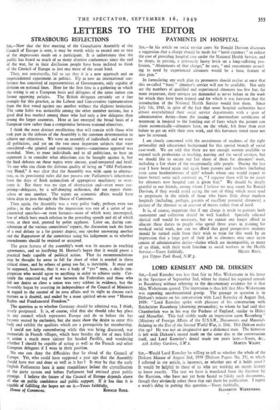LETTERS TO THE EDITOR
STRASBOURG REFLECTIONS
Sta,—Now that the first meeting of the Consultative Assembly of the Council of Europe is over, it may be worth while to record one or two of the impressions made on a participant. It is unfortunate that the public has heard so much of so many abortive conferences since the end of the war, for in their disillusion people have been inclined to think of the Council of Europe as just one more of the usual kind.
They, not unnaturally, fail to see that it is a new approach and an unprecedented experiment in politics. Up to now an international con- ference has consisted of representatives of Governments, only capable of division on national lines. Here for the first time is a gathering in which the voting is on a European basis and delegates of the same nation can favour opposing policies. The British delegates certainly set a fine example for this practice, as the Labour and Conservative representatives from the first voted against one another without the slightest hesitation. The same habit was noticeable among the other member nations, but a good deal less marked among those who had only a few delegates than among the larger countries. Here at last emerged the broad basis of a European view rather than a compromise between national objectives.
I think the most distinct recollection that will remain with those who took part in the debates of the Assembly is the common determination to achieve our objectives. We were an assembly of individuals and we were all politicians, and yet on the two most important subjects that were considered—the general and economic reports—unanimous approval was recorded. Now, to most individuals and to all politicians, to hear an argument is to consider what objections can be brought against it, but the final debates on these topics were sincere, good-tempered and brief. To one who can claim the dubious quality of being an "Old Parliamen- tary Hand," it was clear that the Assembly was wide open to obstruc- tion, as its provisional rules did not possess our Parliament's inheritance from the days of Irish nationalism of appropriate machinery to over- come it. But there was no sign of obstruction and—even more sur- prising—delegates, by a self-denying ordinance, did not repeat them- selves or one another. The report on economic affairs would have taken days to pass through the House of Commons.
Then again, the Assembly was a very polite body, perhaps even too polite ; in the earlier debate the impression was one of a series of un- connected speeches—or even lectures—none of which were interrupted, few of which bore much relation to the preceding speech and all of which were, at their end, greeted by polite applause. Later on, during con- sideration of the various committees' reports, the discussion took the form of a real debate to a far greater degree, one speaker answering another and the Rapporteuv of the committee using his judgement as to whether amendments should be resisted or accepted.
The great feature of the assembly's work was its success in reaching agreements, and so justifying M. Herriot's hopes that it would prove a practical body capable of political action. That its recommendations may be thought by some to fall far short of what is needed in these critical times, and by others of going too far, is inevitable. It must not be supposed, however, that it was a body of " yes" men, a docile con- gregation who would agree to anything in order to achieve unity. Cer- tainly the expected tug of war between the Federalists and those who did not desire so close a union was very seldom in evidence, but the Assembly began by asserting its independence of the Council of Ministers in regard to the control of its own affairs and its right to discuss each matters as it desired, and ended by a most spirited set-to over "Human Rights and Fundamental Freedom."
The question as to whether Germany should be admitted was, I think, wisely postponed. It is, of course, vital that she should take her place in any council which represents Europe and do so before she has become soured by exclusion, but she must show the desire to enter this body and exhibit the qualities which are a prerequisite for membership.
I could not help remembering while this was being discussed, war memorials in French villages, which bore besides the list of men killed in action a much more sinister list headed Fusilles, and wondering whether I should be capable of acting as well-as the French and other European delegates if I were in their position.
No one can deny the difficulties that lie ahead of the Council of Europe. Yet, who could have supposed a year ago that the Assembly should have met and done so well as it has ? It may be that the early English Parliaments bore it some reaemblance Wore the crystallisation of the party system and before Parliament had attained great public Prestige. I believe the future of the Council of Europe depends above all else on public confidence and public support. If it has that it is capable of fulfilling the hopes set on it.—Yours faithfully,


































 Previous page
Previous page